

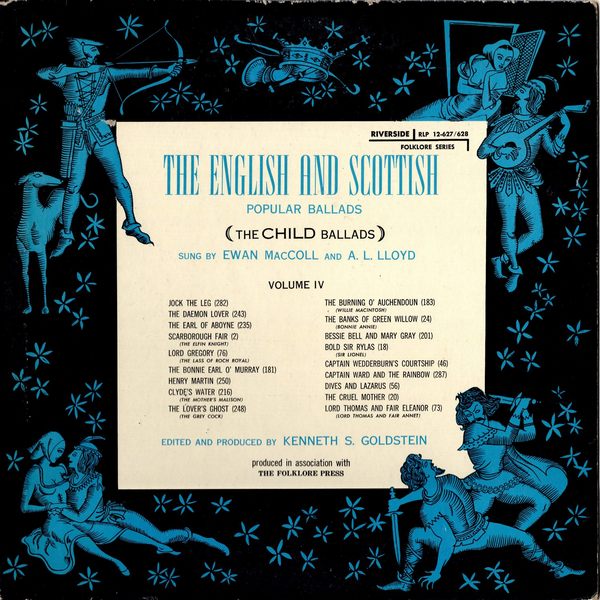 |
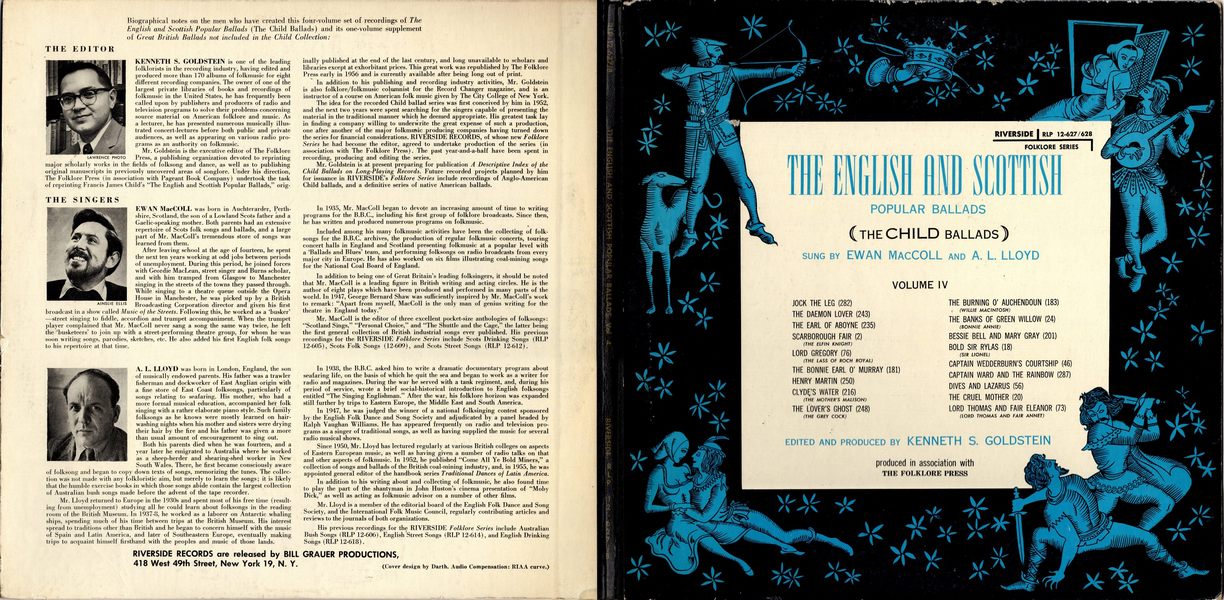
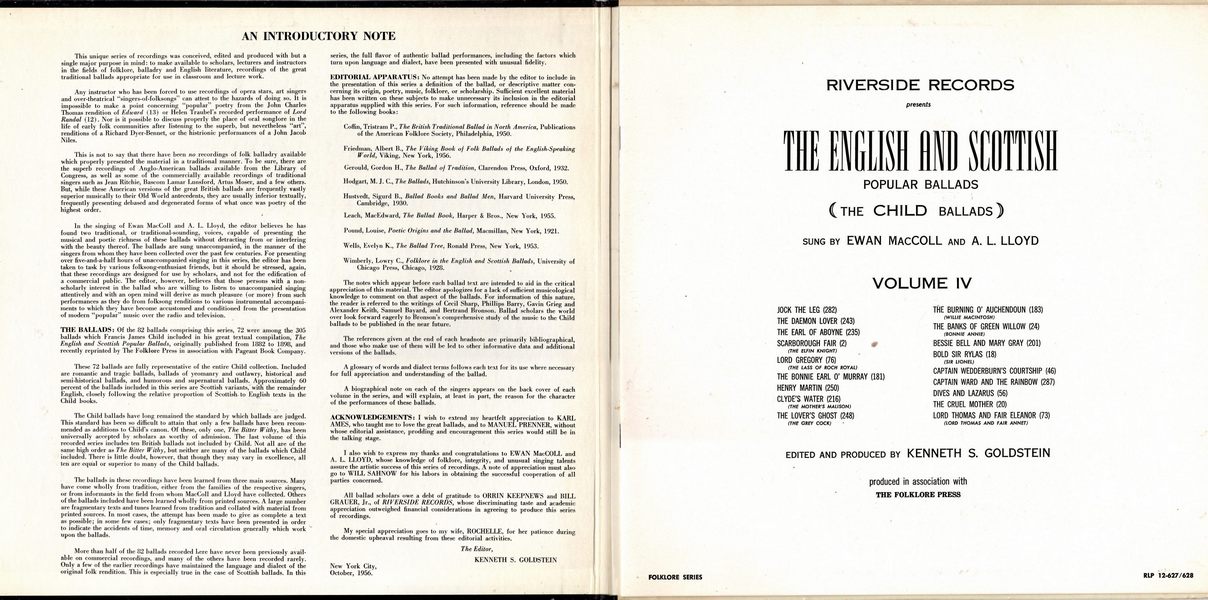
|
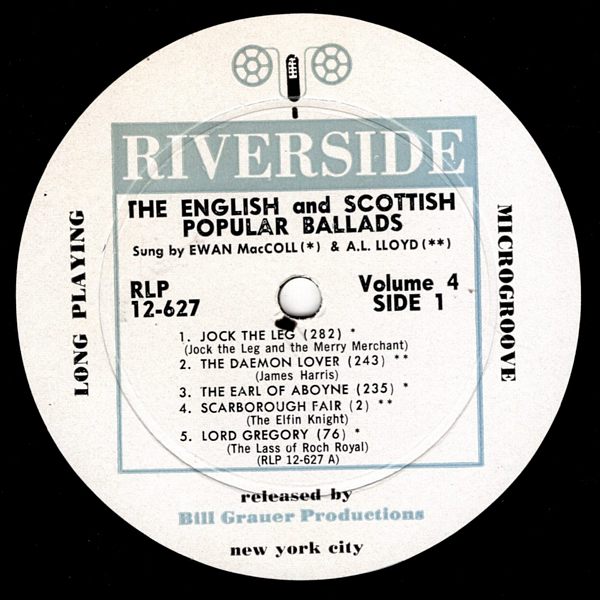
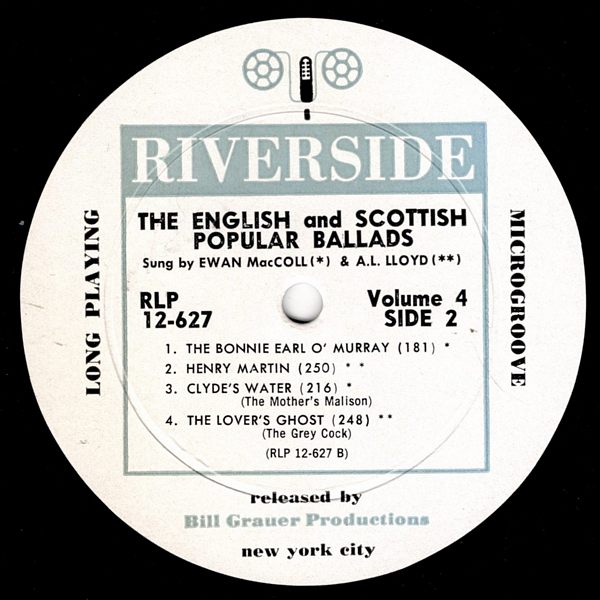
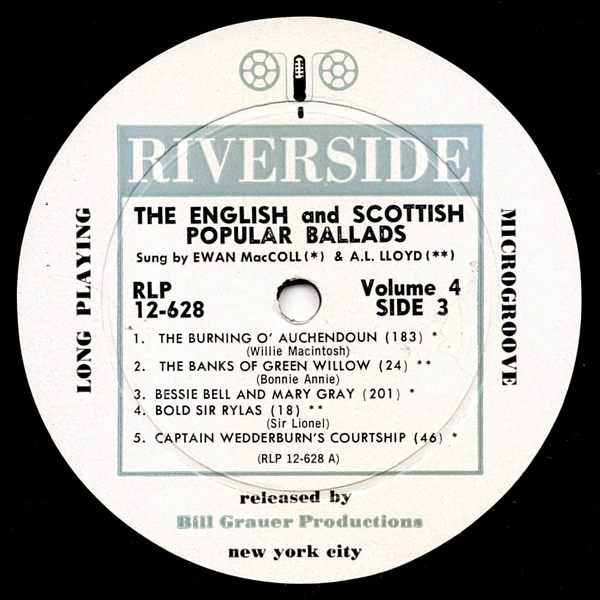
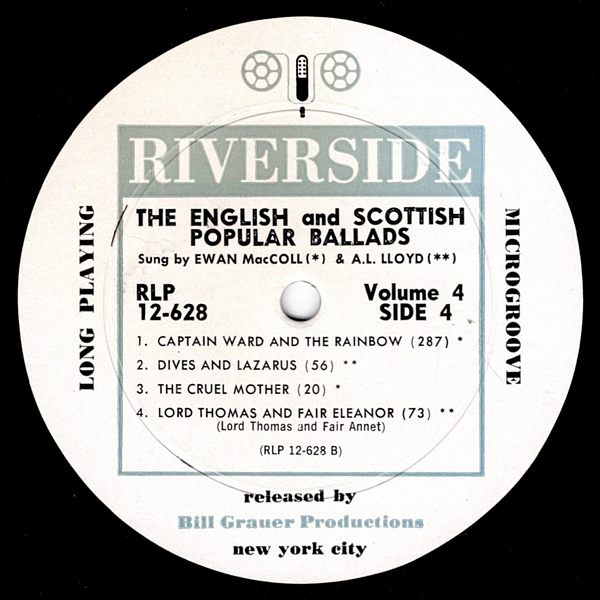 |
Sleeve Notes
Biographical notes on the men who have created the four-volume set of recordings The English and Scottish Popular Ballads (The Child Ballads) and its one-volume supplement of The of Great British Ballads not included in the Child Collection:
THE EDITOR
KENNETH S. GOLDSTEIN is one of the leading folklorists in the recording industry, having edited and produced more than 170 albums of folkmusic for eight different recording companies. The owner of one of the largest private libraries of books and recordings of folkmusic in the United States, he has frequently been called upon by publishers and producers of radio and television programs to solve their problems concerning source material on American folklore and music. As a lecturer, he has presented numerous musically illustrated concert-lectures before both public and private audiences, as well as appearing on various radio programs as an authority on folkmusic.
Mr. Goldstein is the executive editor of The Folklore Press, a publishing organization devoted to reprinting major scholarly works in the fields of folksong and dance, as well as to publishing original manuscripts in previously uncovered areas of songlore. Under his direction, The Folklore Press (in association with Pageant Book Company) undertook the task of reprinting Francis James Child's "The English and Scottish Popular Ballads," originally published at the end of the last century, and long unavailable to scholars and libraries except at exhorbitant prices. This great work was republished by The Folklore Press early in 1956 and is currently available after being long out of print.
In addition to his publishing and recording industry activities, Mr. Goldstein is also folklore/folkmusic columnist for the Record Changer magazine, and is an instructor of a course on American folk music given by The City College of New York.
The idea for the recorded Child ballad series was first conceived by him in 1952, and the next two years were spent searching for the singers capable of presenting the material in the traditional manner which he deemed appropriate. His greatest task lay in finding a company willing to underwrite the great expense of such a production, one after another of the major folkmusic producing companies having turned down the series for financial considerations. RIVERSIDE RECORDS, of whose new Folklore Series he had become the editor, agreed to undertake production of the series (in association with The Folklore Press). The past year-and-a-half have been spent in recording, producing and editing the series.
Mr. Goldstein is at present preparing for publication A Descriptive Index of the Child Ballads on Long-Playing Records. Future recorded projects planned by him for issuance in RIVERSIDE'S Folklore Series include recordings of Anglo-American Child ballads, and a definitive series of native American ballads.
THE SINGERS
EWAN MacCOLL was born in Auchterarder, Perthshire, Scotland, the son of a Lowland Scots father and a Gaelic-speaking mother. Both parents had an extensive repertoire of Scots folk songs and ballads, and a large part of Mr. MacColl's tremendous store of songs was learned from them.
After leaving school at the age of fourteen, he spent the next ten years working at odd jobs between periods of unemployment. During this period, he joined forces with Geordie MacLean, street singer and Burns scholar, and with him tramped from Glasgow to Manchester singing in the streets of the towns they passed through. While singing to a theatre queue outside the Opera House in Manchester, he was picked up by a British Broadcasting Corporation director and given his first broadcast in a show called Music of the Streets. Following this, he worked as a 'busker' — street singing to fiddle, accordion and trumpet accompaniment. When the trumpet player complained that Mr. MacColl never sang a song the same way twice, he left the 'busketeers' to join up with a street-performing theatre group, for whom he was soon writing songs, parodies, sketches, etc. He also added his first English folk songs to his repertoire at that time.
In 1935, Mr. MacColl began to devote an increasing amount of time to writing programs for the B.B.C., including his first group of folklore broadcasts. Since then, he has written and produced numerous programs on folkmusic.
Included among his many folkmusic activities have been the collecting of folksongs for the B.B.C. archives, the production of regular folkmusic concerts, touring concert halls in England and Scotland presenting folkmusic at a popular level with a 'Ballads and Blues' team, and performing folksongs on radio broadcasts from every major city in Europe. He has also worked on six films illustrating coal-mining songs for the National Coal Board of England.
In addition to being one of Great Britain's leading folksingers, it should be noted that Mr. MacColl is a leading figure in British writing and acting circles. He is the author of eight plays which have been produced and performed in many parts of the world. In 1947, George Bernard Shaw was sufficiently inspired by Mr. MacColl's work to remark: "Apart from myself, MacColl is the only man of genius writing for the theatre in England today."
Mr. MacColl is the editor of three excellent pocket-size anthologies of folksongs: "Scotland Sings," "Personal Choice," and "The Shuttle and the Cage," the latter being the first general collection of British industrial songs ever published. His previous recordings for the RIVERSIDE Folklore Series include Scots Drinking Songs (RLP 12-605), Scots Folk Songs (12-609), and Scots Street Songs (RLP 12-612).
A. L. LLOYD was born in London, England, the son of musically endowed parents. His father was a trawler fisherman and dockworker of East Anglian origin with a fine store of East Coast folksongs, particularly of songs relating to seafaring. His mother, who had a more formal musical education, accompanied her folk singing with a rather elaborate piano style. Such family folksongs as he knows were mostly learned on hair-washing nights when his mother and sisters were drying their hair by the fire and his father was given a more than usual amount of encouragement to sing out.
Both his parents died when he was fourteen, and a year later he emigrated to Australia where he worked as a sheep-herder and shearing-shed worker in New South Wales. There, he first became consciously aware of folksong and began to copy down texts of songs, memorizing the tunes. The collection was not made with any folkloristic aim, but merely to learn the songs; it is likely that the humble exercise books in which those songs abide contain the largest collection of Australian bush songs made before the advent of the tape recorder.
Mr. Lloyd returned to Europe in the 1930s and spent most of his free time (resulting from unemployment) studying all he could learn about folksongs in the reading room of the British Museum. In 1937-8, he worked as a laborer on Antarctic whaling ships, spending much of his time between trips at the British Museum. His interest spread to traditions other than British and he began to concern himself with the music of Spain and Latin America, and later of Southeastern Europe, eventually making trips to acquaint himself firsthand with the peoples and music of those lands.
In 1938, the B.B.C. asked him to write a dramatic documentary program about seafaring life, on the basis of which he quit the sea and began to work as a writer for radio and magazines. During the war he served with a tank regiment, and, during his period of service, wrote a brief social-historical introduction to English folksongs entitled "The Singing Englishman." After the war, his folklore horizon was expanded still further by trips to Eastern Europe, the Middle East and South America.
In 1947, he was judged the winner of a national folksinging contest sponsored by the English Folk Dance and Song Society and adjudicated by a panel headed by Ralph Vaughan Williams. He has appeared frequently on radio and television programs as a singer of traditional songs, as well as having supplied the music for several radio musical shows.
Since 1950, Mr. Lloyd has lectured regularly at various British colleges on aspects of Eastern European music, as well as having given a number of radio talks on that and other aspects of folkmusic. In 1952, he published "Come All Ye Bold Miners," a collection of songs and ballads of the British coal-mining industry, and, in 1955. he was appointed general editor of the handbook series Traditional Dances of Latin America.
In addition to his writing about and collecting of folkmusic, he also found time to play the part of the shantyman in John Huston's cinema presentation of "Moby Dick." as well as acting as folkmusic advisor on a number of other films.
Mr. Lloyd is a member of the editorial board of the English Folk Dance and Song Society, and the International Folk Music Council, regularly contributing articles and reviews to the journals of both organizations.
His previous recordings for the RIVERSIDE Folklore Series include Australian Bush Songs RLP 12-606), English Street Songs (RLP 12-614), and English Drinking Songs (RLP 12-618).
AN INTRODUCTORY NOTE
This unique series of recordings was conceived, edited and produced with but a single major purpose in mind: to make available to scholars, lecturers and instructors in the fields of folklore, balladry and English literature, recordings of the great traditional ballads appropriate for use in classroom and lecture work.
Any instructor who has been forced to use recordings of opera stars, art singers and over-theatrical "singers-of-folksongs" can attest to the hazards of doing so. It is impossible to make a point concerning "popular" poetry from the John Charles Thomas rendition of Edward (13) or Helen Traubel's recorded performance of Lord Randal (12). Nor is it possible to discuss properly the place of oral songlore in the life of early folk communities after listening to the superb, but nevertheless "art", renditions of a Richard Dyer-Bermet, or the histrionic performances of a John Jacob Niles.
This is not to say that there have been no recordings of folk balladry available which properly presented the material in a traditional manner. To be sure, there are the superb recordings of Anglo-American ballads available from the Library of Congress, as well as some of the commercially available recordings of traditional singers such as Jean Ritchie, Bascom Lamar Lunsford, Artus Moser, and a few others. But, while these American versions of the great British ballads are frequently vastly superior musically to their Old World antecedents, they are usually inferior textually. frequently presenting debased and degenerated forms of what once was poetry of the highest order.
In the singing of Ewan MacColl and A. L. Lloyd, the editor believes he has found two traditional, or traditional-sounding, voices, capable of presenting the musical and poetic richness of these ballads without detracting from or interfering with the beauty thereof. The ballads are sung unaccompanied, in the manner of the singers from whom they have been collected over the past few centuries. For presenting over five-and-a-half hours of unaccompanied singing in this series, the editor has been taken to task by various folksong-enthusiast friends, but it should be stressed, again. that these recordings are designed for use by scholars, and not for the edification of a commercial public. The editor, however, believes that those persons with a non-scholarly interest in the ballad who are willing to listen to unaccompanied singing attentively and with an open mind will derive as much pleasure (or more) from such performances as they do from folksong renditions to various instrumental accompaniments to which they have become accustomed and conditioned from the presentation of modern "popular" music over the radio and television.
THE BALLADS: Of the 82 ballads comprising this series, 72 were among the 305 ballads which Francis James Child included in his great textual compilation, The English and Scottish Popular Ballads, originally published from 1882 to 1898. and recently reprinted by The Folklore Press in association with Pageant Book Company.
These 72 ballads are fully representative of the entire Child collection. Included are romantic and tragic ballads, ballads of yeomanry and outlawry, historical and semi-historical ballads, and humorous and supernatural ballads. Approximately 60 percent of the ballads included in this series are Scottish variants, with the remainder English, closely following the relative proportion of Scottish to English texts in the Child books.
The Child ballads have long remained the standard by which ballads are judged. This standard has been so difficult to attain that only a few ballads have been recommended as additions to Child's canon. Of these, only one, The Bitter Withy, has been universally accepted by scholars as worthy of admission. The last volume of this recorded series includes ten British ballads not included by Child. Not all are of the same high order as The Bitter Withy, but neither are many of the ballads which Child included. There is little doubt, however, that though they may vary in excellence, all ten are equal or superior to many of the Child ballads.
The ballads in these recordings have been learned from three main sources. Many have come wholly from tradition, either from the families of the respective singers. or from informants in the field from whom MacColl and Lloyd have collected. Others of the ballads included have been learned wholly from printed sources. A large number are fragmentary texts and tunes learned from tradition and collated with material from printed sources. In most cases, the attempt has been made to give as complete a text as possible; in some few cases; only fragmentary texts have been presented in order to indicate the accidents of time, memory and oral circulation generally which work upon the ballads.
More than half of the 82 ballads recorded here have never been previously available on commercial recordings, and many of the others have been recorded rarely. Only a few of the earlier recordings have maintained the language and dialect of the original folk rendition. This is especially true in the case of Scottish ballads. In this series, the full flavor of authentic ballad performances, including the factors which turn upon language and dialect, have been presented with unusual fidelity.
EDITORIAL APPARATUS: No attempt has been made by the editor to include in the presentation of this series a definition of the ballad, or descriptive matter con cerning its origin, poetry, music, folklore, or scholarship. Sufficient excellent material has been written on these subjects to make unnecessary its inclusion in the editorial apparatus supplied with this series. For such information, reference should be made to the following books:
Coffin, Tristram P., The British Traditional Ballad in North America, Publications of the American Folklore Society, Philadelphia, 1950.
Friedman, Albert B., The Viking Book of Folk Ballads of the English-Speaking World, Viking, New York, 1956.
Gerould, Gordon H., The Ballad of Tradition, Clarendon Press, Oxford, 1932.
Hodgart, M. J. C., The Ballads, Hutchinson's University Library, London, 1950.
Hustvedt, Sigurd B., Ballad Books and Ballad Men, Harvard University Press Cambridge, 1930.
Leach, MacEdward, The Ballad Book, Harper & Bros., New York, 1955.
Pound, Louise, Poetic Origins and the Ballad, Macmillan, New York, 1921.
Wells, Evelyn K., The Ballad Tree, Ronald Press, New York, 1953.
Wimberly, Lowry C., Folklore in the English and Scottish Ballads, University of Chicago Press, Chicago, 1928.
The notes which appear before each ballad text are intended to aid in the critical appreciation of this material. The editor apologizes for a lack of sufficient musicological knowledge to comment on that aspect of the ballads. For information of this nature the reader is referred to the writings of Cecil Sharp, Phillips Barry, Gavin Grieg am Alexander Keith, Samuel Bayard, and Bertrand Bronson. Ballad scholars the world over look forward eagerly to Bronson's comprehensive study of the music to the Child ballads to be published in the near future.
The references given at the end of each headnote are primarily bibliographical and those who make use of them will be led to other informative data and additional versions of the ballads.
The notes which appear before each ballad text are intended to aid in the critical appreciation of this material. The editor apologizes for a lack of sufficient musicological knowledge to comment on that aspect of the ballads. For information of this nature, the reader is referred to the writings of Cecil Sharp, Phillips Barry, Gavin Grieg and Alexander Keith, Samuel Bayard, and Bertrand Bronson. Ballad scholars the world over look forward eagerly to Bronson's comprehensive study of the music to the Child ballads to be published in the near future.
The references given at the end of each headnote are primarily bibliographical, and those who make use of them will be led to other informative data and additional versions of the ballads.
A glossary of words and dialect terms follows each text for its use where necessary for full appreciation and understanding of the ballad.
A biographical note on each of the singers appears on the back cover of each volume in the series, and will explain, at least in part, the reason for the character of the performances of these ballads.
ACKNOWLEDGEMENTS: I wish to extend my heartfelt appreciation to KARL AMES, who taught me to love the great ballads, and to MANUEL PRENNER, without whose editorial assistance, prodding and encouragement this series would still be in the talking stage.
I also wish to express my thanks and congratulations to EWAN MacCOLL and A. L. LLOYD, whose knowledge of folklore, integrity, and unusual singing talents assure the artistic success of this series of recordings. A note of appreciation must also go to WILL SAHNOW for his labors in obtaining the successful cooperation of all parties concerned.
All ballad scholars owe a debt of gratitude to ORRIN KEEPNEWS and BILL GRAUER, Jr., of RIVERSIDE RECORDS, whose discriminating taste and academic appreciation outweighed financial considerations in agreeing to produce this series of recordings.
My special appreciation goes to my wife, ROCHELLE, for her patience during the domestic upheaval resulting from these editorial activities.
The Editor,
KENNETH S. GOLDSTEIN
New York City, October, 1956.
Riverside Records are produced by Bill Grauer Productions, Inc.
418 West 49th Street, New York 19, N.Y.